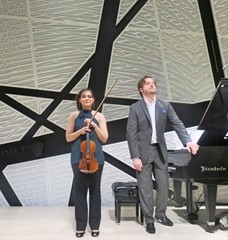|
Back
World Full of Imaginary Cities New York
National Sawdust Theater
07/12/2016 -
“Wild Cities”:
Ruan Anthony Francis: Remix
Clint Needham: On the Road: a. Nothing Behind Me, b. Everything Ahead of Me
Ted Hearne: Nobody’s
Hannah Lash: Adjoining
Reinaldo Moya: Imagined Archipelagos: a. The Island At Noon, b. The Island With the Imagined Birds
Francesca Anderegg (Violin), Brent Funderburk (Piano)

F. Anderegg, B. Funderburk at National Sawdust (© Samuel A. Dog)
Was it coincidence? Three weeks ago, Barge Music presented pianist Nadia Shpachenko playing “The Poetry of Places: Newly-written compositions inspired by diverse buildings”. Last night, National Sawdust presented “Wild Cities”, five works depicting not real places, but imaginary landscapes, movements, travels and changes. Not performed by a single pianist but that exciting, kinetic violinist Francesca Anderegg with pianist Brent Funderburk. And all of it recorded on a New Focus disc.
With the exception of so prolific Hannah Lash, the composers were different, but all of them, in their late 30’s, demonstrated not only their mastery of technique, but mastery of five diverse inspirations. Those inspirations were devoted, overtly or covertly, to the works of Alan Ginsberg and Jack Kerouac. But the music was never the Beat Generation ultra-cool druggy jazz . Each work had an individual character which was 21st Century American, far too singular for any school.
Ms. Lash was, as usual, the composer for which I had the most curiosity. Adjoining, like much of her work, dealing with transformation and surprises. Not jolting trick surprises, but beguiling rather “tame” music which takes strange transubstantiations bringing us listeners usually to the past and often to an unmarked future.
Adjoining began with a series of violin/piano phrases coming out of the late 19th Century. Could that violin have transposing Wieniawski? Or Kreisler? Ms. Anderegg exhibited that so self-conscious virtuosity of those ages, accelerating to a ferocity and ending with the softest and highest notes. The music was like a dream of another era, a sudden waking up, and back to sleep again.
Before that Ms. Anderegg played a solo, Ted Hearne’s Nobody’s, which zoomed us off not to another era, but another place. This was country fiddle-playing with a passion. Those drones on a single string, the dance rhythms, a kind of post-rodeo swing–and all of this with hard, fierce foot-stamps by Ms. Anderegg. Not in sync, but outside of the music, unexpected. All controlled (no drunken Texas swing), but a voyage to an unexpected state.
Clint Needham’s On the Road, was, yes, based on two quotes by Jack Kerouac. The first movement, “Nothing Behind Me” was almost lulling. Mr. Funderburk starting with chords out of De Falla, the duo itself following each other, going forward yet not really getting anywhere. The finish to Kerouac’s sentence, “Everything Ahead of Me”, faster, more purposeful, the answer to what both Kerouac and the “nomadic lifestyle” of Needham’s artist friends, more on the road, on a musical voyage.
The opening Remix by Ryan Anthony Francis, was like a paean to John Adams, a rollicking bit of electronic-style dance music, piano and violin chatting to each other faster and faster, taking wrong turns, spinning away into its own stratosphere, then returning to each once again. It was not mechanical, but it felt…well, it felt good.
My own favorite was at the end, Reinaldo Moya’s Imagined Archipelagos, a title perfectly in line not only with Wild Cities, but Italo Calvino’s Invisible Cities. I couldn’t help comparing this two-movement piece with Xochiquetza by Robert Xavier Rodriguez. Both composers originally from Central America, both of them dealing almost surrealistically with Mayan dances, both of them taking us not to the literal Amerindian music of older composers, but using birdsong, rhythms, Spanish gentility and native frenzy for their own purposes.
Mr. Moya’s second movement, “The Island With the Imagined Birds” was an essay in cross-meters, cross keys, virtuosity from both accomplished players. This, though, was pure joy: the joy of imagination, the joy superceding measured cartographical locales for the more entrancing intriguing locales of the endless imagination.
Harry Rolnick
|